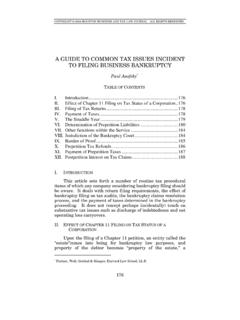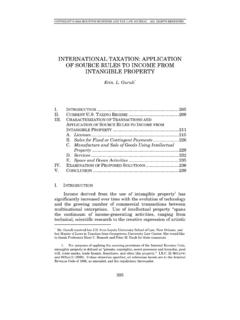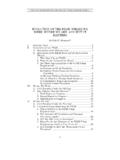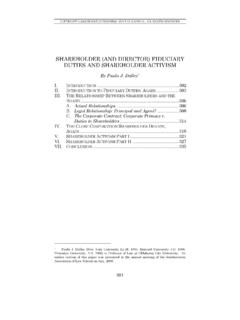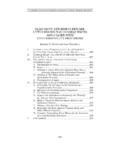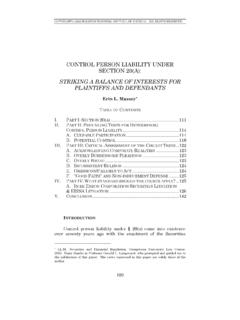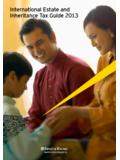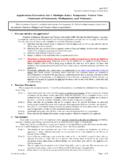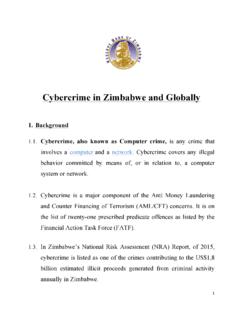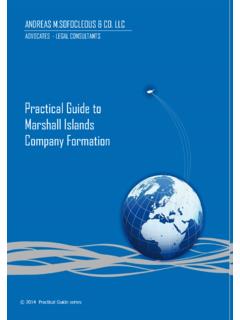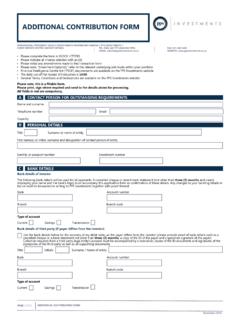Transcription of TAXATION OF CONTINGENT LEGAL FEES ON …
1 COPYRIGHT 2003 HOUSTON BUSINESS AND TAX LAW JOURNAL. ALL RIGHTS RESERVED. 170 TAXATION OF CONTINGENT LEGAL fees ON SETTLEMENTS OR AWARDS Richard E. Sympson* TABLE OF CONTENTS I. II. TAXATION OF PLAINTIFFS DAMAGE SETTLEMENTS OR A. B. Inconsistent Decisions in Federal C. Is a CONTINGENT Attorney Fee Gross Income to the Client?..174 III. CURRENT TAXATION A. Taxable Damage Settlements or 1. Non-physical 2. Accrual of Interest B. Non-Taxable Damage Settlements or 1. Personal Physical (a) Law Prior to 1996 ..176 (b) Changes to the Law in C. Deduction Attributable to Payment of CONTINGENT LEGAL 1. Allocation of LEGAL Expenses to Exempt Income ..178 2. Self-Employed 3. Miscellaneous Itemized Deductions ..179 (a) Subject to 2% (b) Subject to Overall Phase-out of Itemized Deductions ..180 D. Alternative Minimum Tax E. Illustrating Example of Individual Taxpayer IV.
2 FEDERAL COURT DECISION A. Survey of Inconsistent Conclusions in Federal * Youngstown State University, , Case Western Reserve University School of Law, , University of Houston Law Center, , Texas Board of LEGAL Specialization, Board Certified, Tax Law. COPYRIGHT 2003 HOUSTON BUSINESS AND TAX LAW JOURNAL. ALL RIGHTS RESERVED. 2003] TAXATION OF CONTINGENT LEGAL fees 171 B. Taxpayer s 1. Property Rights of Attorneys in Plaintiff s Case ..193 C. IRS s 1. Assignment of Income 2. Principal of Tax 3. Tax Benefit Rule Applied to 4. Open Transaction Doctrine Interpretation of D. The Supreme Court Must 1. Question 2. Analogy to Inheritance Disclaimer E. Congress May 1. Change the Alternative Minimum Tax ..197 2. Change TAXATION of Settlements and Awards to Exclude LEGAL fees .
3 198 V. INTERNAL REVENUE SERVICE A. How the IRS Targets B. Market Segment Specialization Program Audit Technique C. Allocation of Damages Between Various D. 1999 Proposed Regulations on Issuing Form VI. ATTORNEY-CLIENT PRIVILEGE AND SETTLEMENT VII. PLANNING FOR CONTINGENT FEE A. Allocation of LEGAL fees to Various B. LEGAL Reimbursement C. Forum VIII. A. Correct Tax Policy on This B. How Should the Tax Policy be Implemented?..205 I. INTRODUCTION This article will review and discuss the federal individual income TAXATION of CONTINGENT LEGAL fees on settlements or awards in the context of damages received as compensation for injuries or The discussion is limited to recoveries by individual taxpayers, because a business entity cannot suffer a personal 1. The Internal Revenue Code of 1986, the Treasury Regulations thereunder, and the prodigy of federal tax cases that attempt to give guidance, albeit inconsistent, will be examined on the issue.
4 104 (West 1986); Treas. Reg. 1 (2000). COPYRIGHT 2003 HOUSTON BUSINESS AND TAX LAW JOURNAL. ALL RIGHTS RESERVED. 172 HOUSTON BUSINESS AND TAX LAW JOURNAL [Vol. III injury within the meaning of section 104(a)(2).2 The topic is increasingly relevant because, according to recent IRS examination revelations, there are a growing number of large verdicts and settlements that escape Furthermore, taxpayers are improperly excluding income or taking inappropriate deductions for attorney fees paid directly to their Payers of the judgments or awards are not reporting the results correctly to the plaintiffs and plaintiffs attorney s tax advice has been absent or The Internal Revenue Service ( IRS ) fears that verdict and settlement payments are too easily falling through the gap of unreported income.]
5 6 An IRS Audit Guide suggests to agents to research news reports of verdicts and settlements looking for individuals to Taxpayer/plaintiffs and their attorneys need to be aware and give greater consideration to the federal income tax aspects of pursuing and receiving a judgment award or settlement. II. TAXATION OF PLAINTIFFS DAMAGE SETTLEMENTS OR AWARDS A. Introduction Many lawsuits are handled on a CONTINGENT fee basis, with the CONTINGENT fee typically ranging from 25% to of the total amount received by the State law usually requires that the CONTINGENT LEGAL fee agreement be in writing, but recent case law has allowed attorney recovery of oral CONTINGENT fee agreements in quantum meruit from a successor 2. P & X Markets, Inc. v.
6 Comm r, 106 441, 444 45 (1996), aff d without published opinion, 139 907 (9th Cir. 1998). 3. INTERNAL REVENUE SERV., MARKET SEGMENT SPECIALIZATION PROGRAM: LAWSUIT AWARDS AND SETTLEMENTS *2, available at 2000 WL 33171823 (2000) [hereinafter MSSP]. 4. Id. at *20. 5. See id. at *31 (setting forth the reliance on attorney s advice as a factor to determine whether penalties based on inaccuracies and frauds are warranted); see also Sylvia Hsieh, IRS Cracking Down on Plaintiffs, LAW. WKLY. USA, March 5, 2001, at 1, 18 (explaining that changes in the tax law have created confusion for lawyers, which renders their advice inaccurate). 6. MSSP, supra note 3, at *2. 7. Id. at *22; see also Hsieh, supra note 5. 8. See Griffin v. Comm r, 81 (CCH) 972, 974 (2001) (explaining that [d]uring September 1990, petitioner and HGTG retained attorney Vincent F.)
7 Kilborn by means of a CONTINGENT fee arrangement under which the attorney s fee was 52-1/2 percent of any recovery or zero if there was no recovery ). See generally W. Kent Davis, The International View of Attorney fees in Civil Suits: Why is the United States the Odd Man Out in How it Pays its Lawyers?, 16 ARIZ. J. INT L & COMP. L. 361, 374 (1999) (stating CONTINGENT fees in the United States range from twenty-five to forty percent). COPYRIGHT 2003 HOUSTON BUSINESS AND TAX LAW JOURNAL. ALL RIGHTS RESERVED. 2003] TAXATION OF CONTINGENT LEGAL fees 173 attorney for prior LEGAL services Attorneys will often include in the contingency fee agreement arrangements for the payment or reimbursement of expenses associated with prosecuting the plaintiff s cause of The tax problem presented, discussed, and analyzed is when an individual plaintiff who receives a settlement or award, some part of which is taxable, may be taxed on the amount of the CONTINGENT LEGAL fee paid to the attorney.
8 Although the plaintiff/taxpayer is entitled to deduct the LEGAL fee as a miscellaneous itemized deduction (unless it relates to the individual s trade or business), such deduction may provide little benefit due to the 2% of adjusted gross income floor,11 the phase-out of itemized deductions,12 and the adjustment of the miscellaneous itemized deduction for Alternative Minimum Tax The IRS takes the position that the CONTINGENT LEGAL fee is effectively paid by the plaintiff to the attorney after the plaintiff has received, and included in gross income, the settlement or The current TAXATION rules will be discussed and analyzed. The various federal courts have reached inconsistent conclusions concerning the plaintiff s tax treatment of CONTINGENT LEGAL fees , some favoring the taxpayer s position while others favoring the government s position.
9 This article examines the conflict among the Circuit Courts of Appeals and the United States Tax Court, as well as the underlying taxpayer and government tax theories. Some of the inconsistencies surrounding the application of various state laws concern attorney liens, equitable assignment, and general property rights. Various state law principles are examined in an effort to clarify the different results. B. Inconsistent Decisions in Federal Courts The Supreme Court has thus far refused to weigh in on the inconsistent treatment of taxpayers in this This 9. Gagne v. Vaccaro, 766 416, 427 (Conn. 2001). 10. See id. at 424; see also Was Justice Served?, WALL ST. J., Oct. 4, 1995, at A14 (explaining that the contingency fee is normally one third of the amount recovered once expenses have been reimbursed to the attorney).
10 11. 67(a) (2000). 12. 68(a). 13. 56(b)(1)(A)(i). 14. MSSP, supra note 3, at *19 *20 (recognizing the anticipatory assignment principles require a taxpayer to include in gross income the entire amount of judgment/settlement proceeds ). 15. The following cases exemplify the disagreement among the circuits and that COPYRIGHT 2003 HOUSTON BUSINESS AND TAX LAW JOURNAL. ALL RIGHTS RESERVED. 174 HOUSTON BUSINESS AND TAX LAW JOURNAL [Vol. III article will attempt to predict the likely outcome based on other recent authority from the Supreme Court on analogous tax The situation has become more critical for taxpayers after the 1996 changes to the Internal Revenue Code,17 amending 104 to require physical injury or illness before allowing an award for personal damages to be Because more personal damage settlements and awards are now taxable, many taxpayers find themselves paying tax on what they and their attorney In reviewing the current cases, the prior law regarding TAXATION of damage settlements and awards is acknowledged.]
